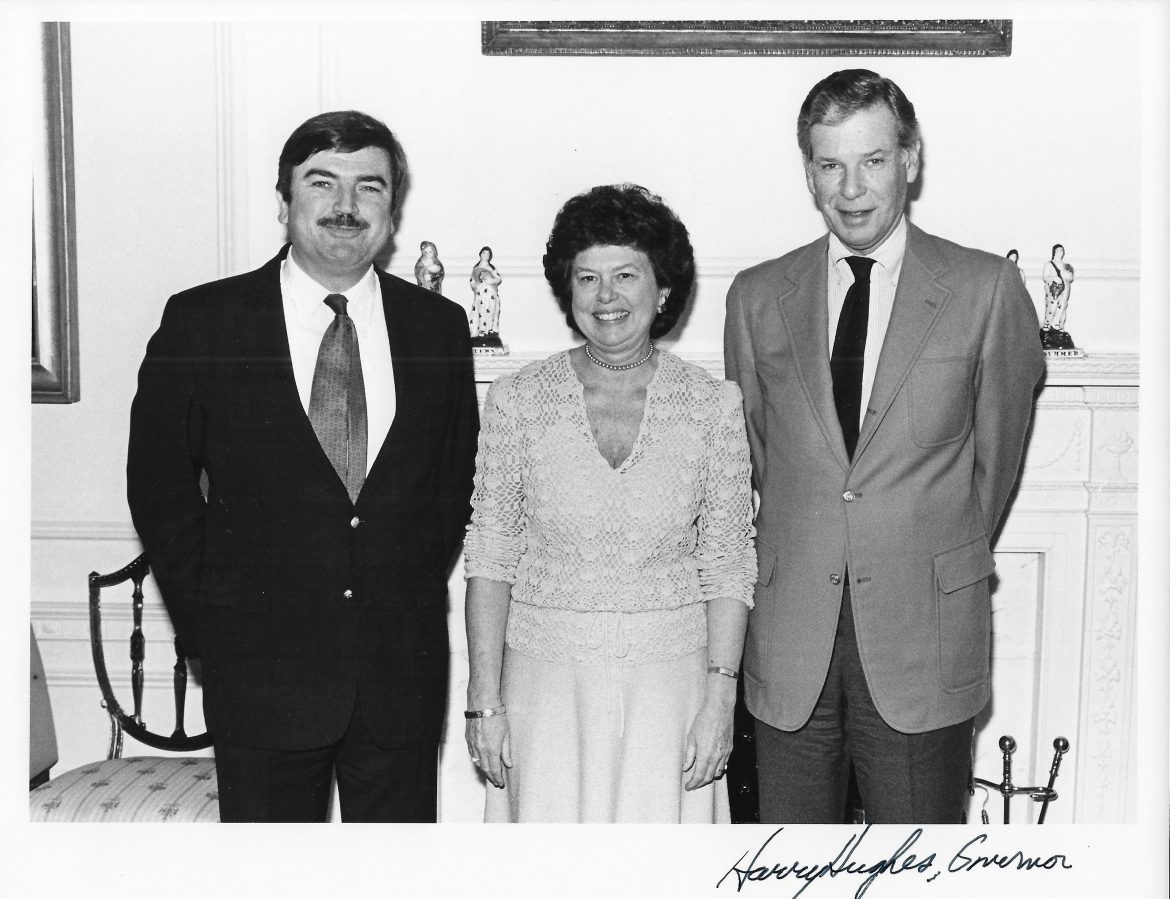Former Maryland Governor Harry Hughes gone but not forgotten
From a reception for the State House press corps at Government House sometime in the early 1980s. From right, Gov. Harry Hughes, wife Pat Hughes, and Len Lazarick, then political editor of Patuxent Publishing. Governor’s Office photo
By Len Lazarick
It was my first time covering a race for governor and I retain this clear visual image of sitting in a small, two-door car — could it have been a Ford Mustang? — outside a community hall in Ellicott City in early 1978, sharing a smoke with the candidate.
Harry Hughes was driving himself, and we were chatting in the front seat. I bummed a Kent from Hughes, the former state transportation secretary, and former state Senate majority leader. Candidates for governor don’t drive themselves anywhere anymore — they didn’t generally do it even back then — and they certainly don’t smoke with reporters. I would have to find the long-ago clip to recall what we talked about.
Later in that campaign season, a wise old machine Democrat would refer to Harry with the golf sneer as “a lost ball in high grass.” Of course, he was, to be sitting there chatting with a reporter for the Columbia Flier, a free community newspaper in the liberal new town.
My publisher’s brother, Wally Orlinsky, president of the Baltimore City Council, was also running with a little known mayor of Frederick named Ron Young, still kicking today as a state senator. Also in the primary was Baltimore County Executive Ted Venetoulis, and the person everyone expected would win — Lt. Gov. Blair Lee and his running mate, state Senate President Steny Hoyer.
Laid-back Hughes was from Denton in Caroline County, still one of the poorest in the state. He was the anti-corruption candidate — Gov. Marvin Mandel was in prison — but Hughes didn’t shoot ahead of the pack till the Baltimore Sun endorsed him on the front page.
Hughes won and would serve two terms. The Senate President his first term was a friend of his from Howard County, Jim Clark. Clark, my main man in Annapolis, would become my mentor and friend. The speaker of the House was a youngish Baltimore City delegate named Ben Cardin. Some Democrats felt Cardin was running the show.
Hughes was a laid-back governor with laid-back staff that no one would much tolerate these days. His last press secretary was the great Baltimore Evening Sun columnist Lou Panos — did you know Baltimore once had three fairly robust newspapers? — whom I would hire a few years later for the once robust Patuxent Publishing chain.
Harry was a gentleman and friendly. That was back in the day when they would hold an annual soiree for reporters at Government House, the governor’s mansion. Now, most of the press corps will not accept food or drink from anyone, especially a governor, which is why the press is now held in such ethically high esteem.
Can you imagine having a snort of Chinese Maotai from a bottle the governor had brought back from China after setting up the first U.S. sister state?
Harry had a great environmental record back when the environment was a new cause — he put a moratorium on catching rockfish that helped restore Maryland’s state fish. But he had a bit of a stumble in his final year over his handling of a savings and loan crisis, and in 1986, he lost a Democratic primary for U.S. Senate to a feisty Baltimore congresswoman named Barbara Mikulski, who would become the longest-serving woman in Congress.
Harry died Tuesday at 92. Wife Pat died nine years ago. They had two daughters, a grandchild, and great-grandchildren.
Environmental service was always on his mind. The Harry R. Hughes Center for Agro-Ecology is named for him.
There’s plenty of gossip to be shared about Harry, but that’s not what matters now. He was a product of an earlier, gentler time. God speed.
Addendum
U.S. Sen. Ben Cardin, who served with Hughes as speaker of the House of Delegates, put out a statement that included:
“It is in the environmental arena where Governor Hughes likely left the strongest legacy, as he signed into law the first multi-state Chesapeake Bay Agreement in 1983. So much of the subsequent progress we have made on restoring the Bay in the last three decades traces to this foundational document, and its passage was a tremendous accomplishment.
“There can be no doubt that Governor Hughes deeply loved the Chesapeake Bay and his native Eastern Shore alike. I consider myself privileged to have served as Speaker of the House during his years as governor and having had the chance to be his partner in advancing Maryland priorities. After he left public office, I made a point to see Governor Hughes whenever visiting Caroline County, and my wife Myrna and I had the chance to spend some time with him just last October. As we left, we remarked that Governor Hughes always reminded us what it meant to be a true statesman, and we are reminded of this again today as we reflect on having lost a trusted friend and advisor. Governor Hughes will be missed, but his lasting contributions to Maryland will not be forgotten.”

MarylandReporter.com is a daily news website produced by journalists committed to making state government as open, transparent, accountable and responsive as possible – in deed, not just in promise. We believe the people who pay for this government are entitled to have their money spent in an efficient and effective way, and that they are entitled to keep as much of their hard-earned dollars as they possibly can.

